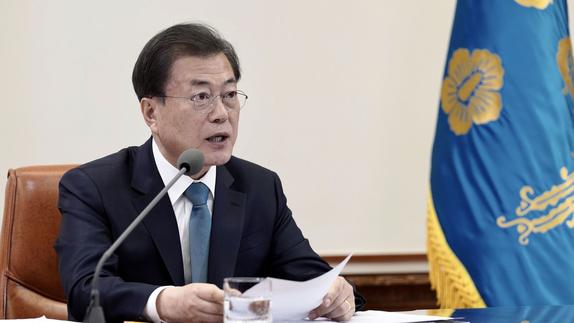 ROK President Moon Jae-in speaks during a virtual summit with global leaders in Seoul on March 26, 2020. (PHOTO / BLOOMBERG)
ROK President Moon Jae-in speaks during a virtual summit with global leaders in Seoul on March 26, 2020. (PHOTO / BLOOMBERG)
SEOUL – Republic of Korea (ROK) President Moon Jae-in offered on Monday to resume inter-Korean cooperation with the Democratic People's Republic of Korea (DPRK) by jointly tackling the COVID-19 outbreak.
(The ROK government) will go and find the most realistic and practical way for inter-Korean cooperation. The COVID-19 crisis can be a new opportunity for inter-Korean cooperation as it is the most urgent and desperate task to cooperate in as of now
Moon Jae-in
ROK president
"(The ROK government) will go and find the most realistic and practical way for inter-Korean cooperation. The COVID-19 crisis can be a new opportunity for inter-Korean cooperation as it is the most urgent and desperate task to cooperate in as of now," Moon said in a meeting with his senior secretaries on the day to mark the second anniversary of the Panmunjom Declaration.
The declaration was signed by Moon and top DPRK leader Kim Jong-un during their first summit on April 27, 2018 at the inter-Korean border village of Panmunjom. The two leaders agreed to the complete denuclearization of and the permanent peace settlement in the peninsula.
ALSO READ:S. Korea reports fewer than 50 new cases, earning WHO praise
"The Panmunjom Declaration opened an irreversible gate of peace, but the past two years from then on was a time to realize once again that peace does not come in a single day," Moon noted.
Moon said the implementation of the declaration had not gained speed, not because of the lack of will of the two Koreas but due to "international restrictions," referring to UN Security Council sanctions towards the DPRK.
The president said his government will not wait until conditions get better, pledging to find and implement anything the two Koreas can do under the current restrictions.
He proposed that ROK and the DPRK could start with cooperation in jointly tackling the COVID-19 before expanding inter-Korean cooperation into jointly dealing with infectious disease in domestic animals, natural disasters in border areas, and climate change.
"An inter-Korean life community can be a foundation to move towards a peace community," Moon noted.
In his New Year address, Moon vowed to seek realistic ways for a broader inter-Korean cooperation while continuing efforts for the success of the DPRK-US denuclearization negotiations.
The DPRK leader and US President Donald Trump held the first-ever DPRK-US summit in Singapore in June 2018, but their second summit ended without any agreement in February 2019 at the Vietnamese capital of Hanoi, leading to the stalled denuclearization talks.
The ROK president advocated a virtuous cycle of improved inter-Korean relations enhancing Pyongyang-Washington denuclearization talks.
To reconnect railways across the inter-Korean border, Moon vowed to do what the ROK can do first.
Earlier in the day, a ceremony was held in the northeastern border town of Jejin to launch the construction of the ROK section of the inter-Korean railway along the east coast of the Korean Peninsula.
The single-track railway reconnection spans 110.9 km from the east coastal city of Gangneung to Jejin. It is expected to cost about 2.85 trillion won (US$2.3 billion).
READ MORE: ROK to start laying southern section of inter-Korean railway
The Gangneung-Jejin railroad is the southern section of the Donghae Bukbu Line, which was built during the 1910-1945 Japanese colonization of the peninsula but was severed during the 1950-1953 Korean War.
Moon and Kim agreed in their Panmunjom summit to modernize and re-link inter-Korean railways and roads along the eastern and western peninsula. The Donghae Bukbu Line construction project was pursued since 2000.
ROK and the DPRK held a groundbreaking ceremony for the inter-Korean railway reconnection in December 2018, but construction works had been delayed amid the international sanctions toward Pyongyang.
The Moon government hoped to reconnect railways across the inter-Korean border, eventually connect to Europe through the Trans-China Railway (TCR) and the Trans-Siberian Railway (TSR).


